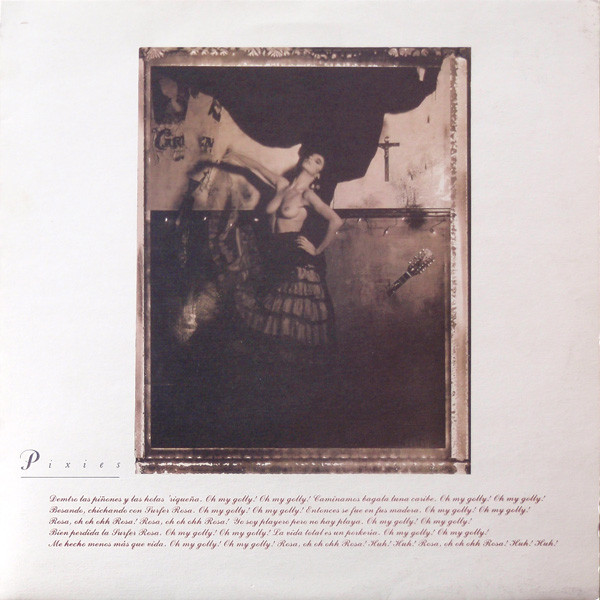It’s the way Dave Lovering’s drums crash in. Then there’s that Kim Deal bass line that walks in just the wrong side of sexy, and the riff. My word, that riff. And the incessant rhythm guitar that just doesn’t stop. The Black Francis’s vocals come in delivering those weird lyrics. And the whole thing sounds so live. So arid, yet so natural and full of life. Okay, so Steve Albini prefers to see him self as a sound archivist than a producer. I don’t care what job description he wants to give himself, I just want more rock music to sound as brutally vital to life as Pixies “Bone Machine” does.
Okay, so Surfer Rosa grabs your attention in an utterly inescapably brilliant way, but it has got to loosen its grip on you before it looses steam. Surely?
No.
“Break My Body” continues the assault on the senses, but this time with a distinct pop edge. That’s if pop music delivered freaky stuff like Francis’s obsession with sex, religion and violent imagery. Francis and Deal’s voices intertwine and the whole things sounds like the audio equivalent of a strangely pleasurable rope burn. Then the aggressions ramps up with “Something Against you”, where Francis’s hugely distorted vocal continually wanders on the far side of indecipherable.
Okay, we’re three tracks in and Pixies have already re-written the rule book on loud and heavy rock music. Then comes “Broken Face”, and while this thrillingly alien world of rock and roll just seems to start to make some sort of sense, they manage to deliver perfectly packaged weirdness in just 90 seconds. Oh, and now comes “Gigantic” where Kim Deal stakes her claim to be the greatest female vocalist in pop in the space of a single song. “Gigantic” is Surfer Rosa’s unashamedly accessible and commercial moment, with it’s huge (some would say gigantic) chorus, wall of guitars, and Lovering’s unstoppable drumming. Sure, it’s got to hurt Francis’s pride that Deal steps forward to take the lead vocal for one song, and in doing so damn near steals the show, but hey Pixies wouldn’t be Pixies without weird tension going on at every conceivable level, so there you go.
For all it’s heavy weirdness, Surfer Rosa has a pop-edge to it which just cannot be denied. “River Euphrates” has the dynamics of a pop single, albeit one that is utterly buried under walloped drums, and guitars that seem to bend around your head thanks to Albini’s recording techniques. And what the hell is this? It’s that song from the end of ‘Fight Club’ in all it’s brutal beauty. I mean listen to it. Violent and ethereal. Rock music just isn’t supposed to be able to do two things as diverse as that simultaneously, but somehow Pixies manage it with apparent ease.
So what now? Oh, how about “Cactus”? A song of such quality that David Bowie would quite happily record a cover version of it on his best album since his 70s heyday. Yes, because that’s what happens when your debut album absolutely re-writes the rules of rock music! Oh, so you want a seemingly throw-away number, that also sounds like one of the greatest television themes never recorded? How about “Tony’s Theme”? It’s almost incomprehensible how good Surfer Rosa was when it was released, and still is. Hell, Black Francis habitually slips into Spanish for “Oh My Golly!”, and the mind-melting sonic freak-out that is “Vamos”. I mean come on! There is no way that this should actually work! So how can it be so utterly, utterly, brilliant? Hell, there’s even studio banter that doesn’t make you want to throttle everyone involved!
While “I’m Amazed” might only be 98 seconds long, it still manages to squeeze in a massive chorus, a squealing guitar riff, a blistering Joey Santiago guitar solo, Lovering knocking the hell out of his drums in a way that Neil Peart would be proud. Most rock songs can’t manage half of that even with triple that run time! How? Just how was this musical sorcery achieved?
Surfer Rosa closes with “Brick is Red”, a song on which it would be possible to write volumes on the sound quality of the acoustic guitar alone, but only on the understanding that there would also be further multiple-volumes on the sound that Albini managed to get out of Lovering’s drums, Santaiago’s twisting riffs, and the way the Francis’s and Deal’s voices interlock. Oh and Francis’s lyrics, which seemingly demand a PHD written about them. “Brick is Red” is the perfect way to end an album so seeped in blood, sex, violence and religion as Surfer Rosa, as it leaves you as the listener utterly exhausted, but knowing that you’ll inevitably be coming back for more far more frequently than is necessarily healthy for you.
It really is impossible to measure the size of the musical impact crater that Pixies created with Surfer Rosa. While the previously mentioned David Bowie cited them as an inspiration, the fact that movers and shakers like PJ Harvey, Arcade Fire and Pavement have all mentioned Pixies as hugely influential on their own work, gives you a tiny idea of just how much alternative rock holds a Pixies influence. Oh, and there were those two obscure acts, Nirvana and Radiohead, but hell, who could ever consider those guys to be an influence on anybody?
So yeah, after releasing such a brutal and brilliant album as Surfer Rosa, you’d have expected Pixies and Steve Albini to be a lock-in to work together on all their albums, right?
Nope.
Surfer Rosa was a one off. But really, do you think anyone would have survived another album this intense?














No Comment